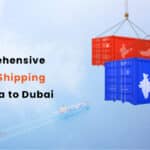Dubai stands as a global logistics hub, connecting markets across Asia, Europe, and Africa. With its strategic location and world-class infrastructure, the emirate handles millions of tons of cargo annually, with express shipments driving e-commerce and time-sensitive trade. However, customs clearance can make or break delivery timelines. Delays cost money and disrupt supply chains. This guide equips importers, exporters, and logistics managers with expert strategies to achieve record-time customs clearance for express cargo in Dubai.
Understanding Dubai’s Customs Clearance Process
Customs clearance is the process of ensuring imported or exported goods comply with UAE regulations, including documentation, duties, and inspections. Dubai Customs, a global leader in efficiency, oversees this at ports like Dubai International Airport (DXB) and Jebel Ali Port. Efficient clearance reduces lead times, enabling businesses to meet tight schedules. For express shipments, speed is critical—delays can disrupt e-commerce deliveries or halt production lines. Understanding Dubai’s streamlined processes, supported by digital tools, helps logistics managers save time and costs while maintaining compliance.
Step-by-Step Process for Express Shipment Clearance
Clearing express cargo in Dubai involves precise steps. Follow these to minimize delays:
- Obtain an Importer Code: Register with Dubai Customs to get a unique code for declarations.
- Prepare Documentation: Gather essential documents—Commercial Invoice, Certificate of Origin (CoO), Airway Bill (AWB) or Bill of Lading (BL), and Import Permits if required.
- Submit Declaration: Use the Dubai Trade Portal for digital submission of your customs declaration. This platform integrates all stakeholders for seamless processing.
- Customs Inspection and Release: Goods may undergo risk-based inspections using AI-driven systems. Once cleared, pay duties to release the shipment.
Digital submissions via the Dubai Trade Portal reduce paperwork errors and speed up approvals, often within hours.
How Technology Helps You Clear Shipments Faster
Dubai’s customs ecosystem leverages cutting-edge technology to accelerate clearance. The Dubai Trade Portal centralizes documentation, connecting freight forwarders, customs, and ports. AI-driven risk profiling identifies low-risk cargo, minimizing physical inspections. Automated scanning systems, like those at Jebel Ali, prioritize express cargo, reducing queue times. By using e-Services and staying updated on digital tools, businesses can bypass traditional bottlenecks and ensure faster turnaround.
Practical Tips to Accelerate Customs Clearance
Accelerating customs clearance in Dubai requires careful preparation, attention to detail, and the smart use of available systems and processes. Here are key practical tips to help you clear your shipments faster and avoid unnecessary delays:
1. Ensure Complete and Accurate Documentation
Submit all required paperwork clearly and correctly. This includes:
- Commercial Invoice
- Packing List
- Air Waybill or Bill of Lading
- Certificate of Origin
- Import/Export permits (if applicable)
Errors, omissions, or inconsistent values in these documents are among the top causes of clearance delays. Always double-check product descriptions, quantities, and HS codes to prevent misclassification.
2. Register and Use Dubai’s Online Customs Portals Efficiently
Importers must have a valid importer code and register their company with relevant customs systems. Submit declarations electronically through official customs platforms. Processing your shipments through trusted online systems speeds up clearance and provides real-time tracking.
3. Pre-Pay Duties and Taxes
Ensure applicable customs duties and VAT are paid promptly. Delayed payments can result in shipments being held indefinitely. Many shipments are cleared automatically once payment is confirmed, so settling invoices early helps keep cargo moving.
4. Use Technology to Your Advantage
Take advantage of smart tools that streamline the customs declaration process. These platforms allow for faster clearance by reducing manual processing, providing real-time updates, and minimizing the need for face-to-face interaction.
5. Work With Experienced Customs Brokers or Logistics Partners
Licensed customs brokers and freight forwarders understand local regulations, documentation standards, and procedures. They can:
- Help avoid common inefficiencies
- Reduce paperwork errors
- Navigate inspections more quickly
- Communicate with customs authorities on your behalf
6. Stay Updated on Local Regulations and Tariff Codes
Dubai Customs frequently updates procedures, tariffs, and HS code classifications. Keeping current ensures that your documentation is always compliant and that you avoid penalties or resubmissions due to obsolete rules.
7. Plan for Inspections and Communicate Proactively
Some shipments may be flagged for physical inspections or scanning. While unpredictable, you can pre-alert your logistics team and customer about this possibility. Good communication across your supply chain helps minimize disruption if delays occur.
By following these best practices from preparing flawless documents to leveraging technology and engaging expert partners, importers and exporters can dramatically cut down customs processing time and improve speed-to-market across the UAE.
Avoiding Common Mistakes and Delays
Delays often stem from avoidable errors. Common issues include:
- Incorrect Documentation: Missing or inaccurate invoices, CoOs, or AWBs lead to holds.
- Wrong HS Codes: Misclassified goods cause reprocessing delays.
- Unpaid Duties: Failure to settle duties promptly halts clearance.
To correct errors, resubmit accurate documents via the Dubai Trade Portal. For complex issues, contact the Dubai Customs Helpdesk at 800-80080 or via their website. Proactive preparation and real-time tracking prevent most delays, keeping your shipments on schedule.
Must-Have Documentation Checklist
Ensure these documents are ready for smooth clearance:
- Commercial Invoice: Details the transaction, including value and description.
- Packing List: Specifies shipment contents, weight, and dimensions.
- Airway Bill (AWB) / Bill of Lading (BL): Proof of transport contract.
- Certificate of Origin (CoO): Verifies the goods’ country of origin.
- HS Code List: Accurate codes for all items.
- Duty Payment Proof: Receipt of paid customs duties.
- Regulatory Permits: Required for restricted goods like pharmaceuticals.
Download a printable checklist here for easy reference.
Dealing with Restricted or Special Cargo
Certain goods, like food, pharmaceuticals, textiles, or electronics, require additional permits from regulatory bodies like the UAE Ministry of Health or Dubai Municipality. Check Dubai Customs’ Restricted Items List to identify requirements. For example, pharmaceuticals need pre-approval, while perishables require health certificates. Submitting permits with your declaration avoids delays. Always consult your customs broker for guidance on compliance to ensure seamless clearance.
Choosing the Right Logistics Partner: 5 Things to Look For
Choosing the right logistics partner in Dubai can make a big difference when it comes to fast customs clearance and hassle-free shipping. Here are five key things to keep in mind.
Know your needs
Start by getting clear on what kind of logistics support your business actually needs. Do you need help with international shipping, cold storage, customs clearance, or last-mile delivery? If your products are fragile, perishable, or sensitive, you’ll want a partner who has the right tools and experience. When you know exactly what you’re looking for, it’s easier to find a provider that fits your business, not just any logistics company.
Look for industry experience
Having logistics experience is great, but having experience in your specific industry is even better. Whether you’re in e-commerce, food, pharmaceuticals, or retail, working with a partner who understands your type of product and the rules that apply can help avoid unnecessary delays and complications.
Check their capacity
Can they manage your order volume, especially during busy times of the year? Make sure they have enough warehouse space, delivery vehicles, and a strong team to grow with your business. It’s also important to check if they can deliver to all your key locations, especially if you’re shipping outside Dubai or internationally.
Ask about tech and tracking
The best logistics companies use smart systems that let you track your shipments in real time. Look for features like online dashboards, automatic updates, and easy digital paperwork. Good technology can save time, cut down on errors, and make customs clearance faster and smoother.
Reputation and service matter
Take time to read reviews, browse through case studies, or even talk to a few of their current clients if possible. A reliable logistics partner will communicate well, solve problems quickly, and be upfront about pricing. Rather than just going with the cheapest option, choose a company that’s known for dependable service and fair pricing.
FAQs
How long does clearance take for express cargo?
Clearance time for express cargo varies based on the location and the accuracy of your documentation. At Dubai International Airport (DXB), clearance can be completed within 1 to 4 hours if pre-clearance procedures are followed correctly. At Jebel Ali Port, the process typically takes between 24 to 48 hours. Delays are often caused by missing or incorrect paperwork, so submitting complete and accurate documentation in advance is essential for faster processing.
How can I find out if my shipment is being inspected?
To check if your shipment is undergoing inspection, you can log into the Dubai Trade Portal and track its current status. The platform provides real-time updates on the movement and handling of your goods. If further details are needed, contacting the Dubai Customs helpdesk can offer additional clarification and support during the process.
What happens if the HS code on my shipment is incorrect?
Using an incorrect Harmonized System (HS) code can lead to delays and complications. Customs authorities will flag the error and halt the clearance process until the correct code is submitted. You’ll be required to update and resubmit the relevant documents with the accurate HS classification. This not only causes delays but may also result in penalties or re-evaluation of duties and taxes.
Conclusion
Fast-tracking customs clearance for express cargo in Dubai demands preparation, digital tools, and reliable partners. By mastering documentation, leveraging technologies like iDeclare, and avoiding common errors, businesses can achieve record-time clearances. Stay proactive, use Dubai’s digital ecosystem, and work with licensed brokers to keep your supply chain moving. Need help fast-tracking your cargo through Dubai Customs? Speak to our experts today. We specialize in express clearance and logistics optimization.
Looking for Reliable Shipping Services in Dubai?
If you need expert solutions for shipping, freight forwarding, or warehouse services, KGRN Shipping Service LLC has you covered. Based in Dubai, we provide professional, reliable, and tailored logistics support to meet your needs.
Contact Us Now




Leave A Comment